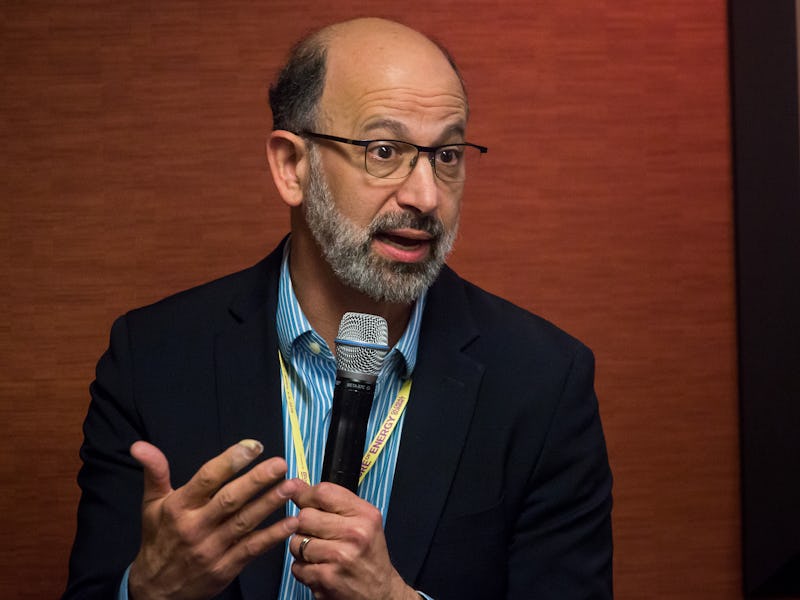Bill Weihl made Facebook green. Now he's eyeing a bigger fight.
Former Google and Facebook sustainability czar Bill Weihl has launched an effort to make corporations fight climate change.

Former Google and Facebook sustainability czar Bill Weihl has launched an effort to pressure corporations like his former employers to step up and do more to fight climate change. The group, ClimateVoice, is made up of students, activists and corporate executives.
The launch of ClimateVoice was announced this past weekend at the ClimateCAP conference in Charlottesville, Virginia. The group's website describes it as a "new initiative designed to mobilize the workforce to urge corporate advocacy of pro-climate public policies." Students and current employees of these corporations will work to increase companies' internal commitments to fighting climate change and to get corporations to publicly support policies that will help us fight climate change.
Weihl managed sustainability and energy efficiency initiatives at Facebook from 2012 to 2018. Prior to that, he spent six years as the Green Energy Czar at Google. He was named one of Time Magazine's Heroes of the Environment in 2009. Besides leading ClimateVoice, he is also currently a member of the board of directors at the Sierra Club.
One of the first goals of ClimateVoice will be to help get Virginia's Clean Economy Act passed. That bill would have the state move to using 100 percent renewable energy by 2050, among other things. That's not the boldest plan out there, but it looks like it could pass, and Weihl tells Inverse no climate legislation is perfect and progress of any kind is important. ClimateVoice is also pushing to help get Illinois' Clean Energy Jobs Act passed.
Weihl says ClimateVoice will push corporations to speak out in favor of policies that would help stop climate change in the states where they operate.
"It would be great to get comprehensive federal policies, but I think given the current situation in Washington, that's not going to happen soon," Weihl says. "There are a lot of opportunities at the state, local and regional level in this country and in other countries where we will get better policies sooner if we have more business voices speaking up in favor."
"More often than not, they win. The playing field is seriously tilted in favor of the status quo."
Corporations speaking up in favor of LGBTQ rights has been effective in the past, Weihl says, and that's what inspired him to take this approach. He says companies stood up to discrimination because they realized their employees and students that were considering working for them wanted them to.
Weihl is happy with the work he did at Google and Facebook that helped make those companies more sustainable, and he says Facebook is on target to run on 100 percent renewable energy this year, but he says he did not feel like he could get these companies to speak out about climate policies while he was working for them.
"I definitely did not feel like, from the inside, I could get companies to really speak out on public policy," Weigl says. "When it comes to public policy, they speak out today when they see a real need in terms of their operations."
Weihl says most companies don't speak out about public policies that have to do with climate change. He says they often fear a backlash from politicians or their own customers and decide to stay silent. This gives the fossil fuel industry a major advantage.
"That means that when there's a public policy that could drive rapid change, the fossil fuels companies get in there and fight it, and they put a lot of lobbying muscle behind it and big advertising campaigns," Weihl says. "More often than not, they win. The playing field is seriously tilted in favor of the status quo."
Some companies also have financial incentives to stay quiet. As its own employees have been protesting lately, companies like Amazon do business with the fossil fuel industry and make good money doing it, so they likely want to keep that relationship intact.
"I think a lot of companies have major clients who are fossil fuel companies," Weihl says. "My guess is they are not small contracts. That's one of the conflicts these companies face. They worry about political backlash and consumer backlash if they speak up on a controversial topic, but if they speak up in a way that some of their big customers would view as harmful, they could see those big customers bailing on them."
ClimateVoice will start its efforts by encouraging companies to speak out in favor of certain policies and will praise the ones that do. Weihl says that months after that part of the effort, they will start "naming names" and call out the companies that are refusing to speak out.
"Our goal is to create both the positive feedback when companies speak up and the negative feedback when they stay silent," Weihl says.
See also: Why millennials everywhere are killing climate change denial
Students and current employees at major corporations who want to sign ClimateVoice's pledge and support the campaign can remain anonymous if they so desire. ClimateVoice will keep track of how many students sign it, how many people from each company sign it and more but won't release actual names of specific signers unless given permission. Weihl thinks that when companies see how many people are demanding they speak out—including their own employees—they'll start to take notice.
"Companies compete really hard for top talent, and if we can make it easier for the companies that are speaking up to compete and harder for the ones that are staying silent, that could make speaking up a competitive advantage," Weihl says.